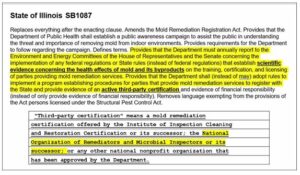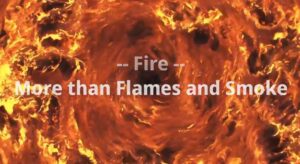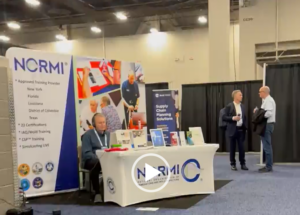Illinois Mold Training Requirement
Starting Jan 2025, Illinois will be requiring evidence of an active third-party certification.

NORMI's Next CMACMR Class
Dec 10th -12th Online Live or Onsite Tampa Florida
$799.00 Holiday Special
https://www.besttrainingschool.com/cgi-bin/liveonline2db.cgi?ClassNumber=CMACMR-241210-E-001#reg-now
NORMI's Live training classes have been training in the industry for over 20 years. We are here for you offering Live online classes, Membership and business advertising on our NORMI PRO Locator,
Contact us for more information
Brenda Lewis – BrendaL@normi.com – 989-657-3756
Jayme Crean – JaymeC@normi.com – 989-916-6264
AN ACT concerning health. |
||
| 2 | Be it enacted by the People of the State of Illinois, |
|
| 3 | represented in the General Assembly: |
|
| 4 | Section 5. The Mold Remediation Registration Act is |
|
| 5 | amended by changing Sections 5, 10, 15, 20, and 25 and by |
|
| 6 | adding Section 16 as follows: |
|
| 7 | (410 ILCS 105/5) |
|
| 8 | Sec. 5. Findings. The General Assembly finds that: |
|
| 9 | (1) Excessive indoor dampness in buildings is a |
|
| 10 | widespread problem that warrants action at the local, |
|
| 11 | State, and national levels. |
|
| 12 | (2) Because of the public's concern about the possible |
|
| 13 | public health effects of exposure to mold in buildings, as |
|
| 14 | well as the effects on workers performing remediation |
|
| 15 | work, and the costs of remediation for the property owner, |
|
| 16 | there is a need to identify parties performing mold |
|
| 17 | remediation in the State. |
|
| 18 | (3) Because there is a need to reduce moisture that |
|
| 19 | fosters mold formation in buildings, the State should |
|
| 20 | review current State building codes to ensure that they do |
|
| 21 | not foster mold. |
|
| 22 | (4) Parties providing mold remediation services in |
|
| 23 | residential, public, and commercial buildings in Illinois |
|
|||||||
| 1 | should be required to register with the State and provide |
||||||
| 2 | proof of financial responsibility. |
||||||
| 3 | (5) Laboratories performing tests to confirm mold |
||||||
| 4 | contamination in buildings should be certified by the |
||||||
| 5 | American Industrial Hygiene Association using nationally |
||||||
| 6 | recognized accreditation standards set under the |
||||||
| 7 | Environmental Microbiology Laboratory Accreditation |
||||||
| 8 | Program. |
||||||
| 9 | (6) It is imperative that the citizens of Illinois are |
||||||
| 10 | aware of the dangers of mold and the need for proper |
||||||
| 11 | assessment and remediation of indoor environments affected |
||||||
| 12 | by mold. |
||||||
| 13 | (Source: P.A. 95-456, eff. 1-1-08.) |
||||||
| 14 | (410 ILCS 105/10) |
||||||
| 15 | Sec. 10. Definitions. As used in this Act: |
||||||
| 16 | "Department" means the Department of Public Health. |
||||||
| 17 | "Mold" means any form of multicellular fungi found in |
||||||
| 18 | water-damaged indoor environments or water-damaged building |
||||||
| 19 | materials. "Mold" includes Cladosporium, Penicillium, |
||||||
| 20 | Alternaria, Aspergillus, Fusarium, Trichoderma, Memnoniella, |
||||||
| 21 | Mucor, and Stachybotrys chartarum. |
||||||
| 22 | "Mold remediation" means the removal, cleaning, |
||||||
| 23 | sanitizing, demolition, or other treatment, including |
||||||
| 24 | preventive activities, of mold or mold-containment matter in |
||||||
| 25 | buildings. |
||||||
|
|||||||
| 1 | "Preventative activities" include those intended to |
||||||
| 2 | prevent future mold contamination of a remediated area, |
||||||
| 3 | including applying biocides or anti-microbial compounds. |
||||||
| 4 | "Third-party certification" means a mold remediation |
||||||
| 5 | certification offered by the Institute of Inspection Cleaning |
||||||
| 6 | and Restoration Certification or its successor; the National |
||||||
| 7 | Organization of Remediators and Microbial Inspectors or its |
||||||
| 8 | successor; or any other national nonprofit organization that |
||||||
| 9 | has been approved by the Department. |
||||||
| 10 | (Source: P.A. 95-456, eff. 1-1-08.) |
||||||
| 11 | (410 ILCS 105/15) |
||||||
| 12 | Sec. 15. Reporting requirement. The Department must report |
||||||
| 13 | to the Environment and Energy Committees of the House of |
||||||
| 14 | Representatives and the Senate, on an annual basis, concerning |
||||||
| 15 | the implementation of any federal regulations or State rules |
||||||
| 16 | that establish: |
||||||
| 17 | (1) scientific evidence concerning any health effects |
||||||
| 18 | associated with fungi, bacteria, and their byproducts in |
||||||
| 19 | indoor environments including any indoor air quality |
||||||
| 20 | standard; and |
||||||
| 21 | (2) standards for the training, certification, and |
||||||
| 22 | licensing of parties providing mold remediation services |
||||||
| 23 | in residential, public, and commercial buildings. |
||||||
| 24 | (Source: P.A. 95-456, eff. 1-1-08.) |
||||||


